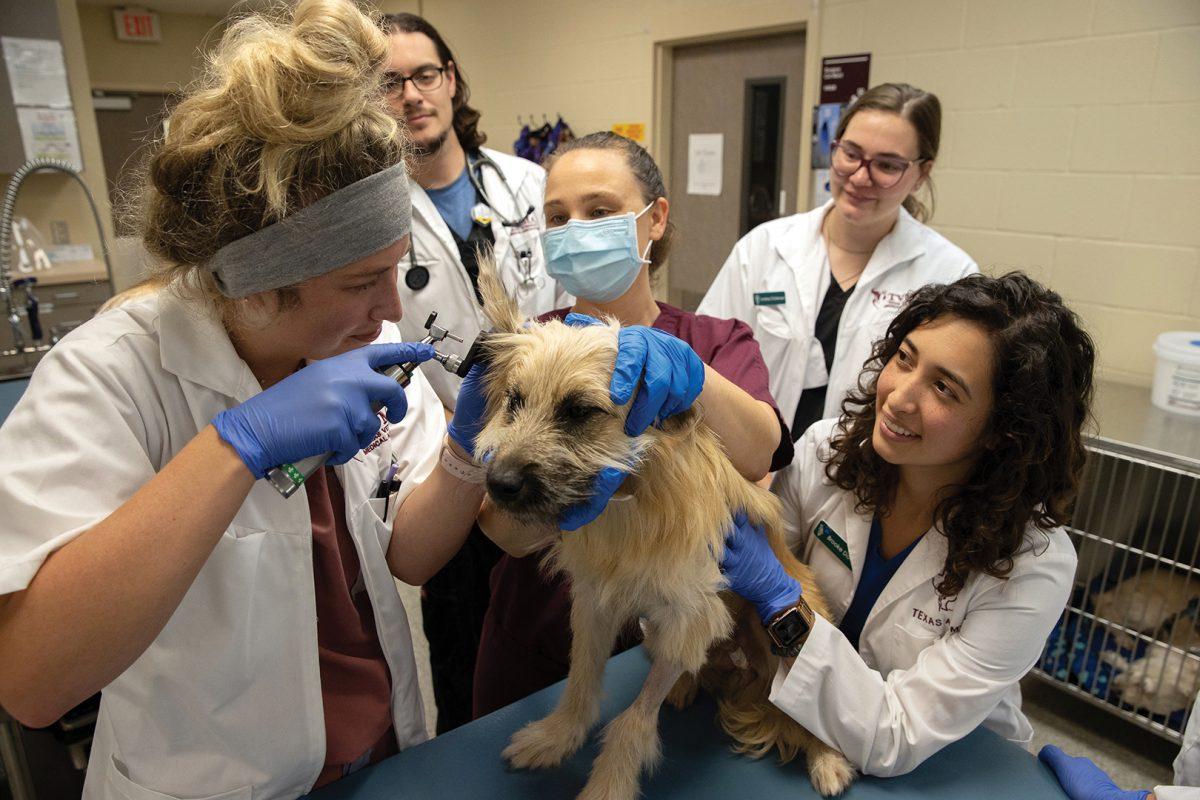Texas A&M’s veterinary school was recently ranked 11th in the world. However, College Station residents might not know the school offers not only training to future vets, but discounted treatment for their pets.
Dr. Stacy Eckman is the associate dean of the veterinary hospital’s operations. Eckman said the hospital operates a primary care clinic that functions like any other veterinary clinic, treating the pets of the public.
“We have a Primary Care Service, very much like a regular general practice, that students can visit for routine care,” Eckman said. “Students, faculty and staff receive a 20% discount. A student could simply call and make an appointment for routine care. In the case of an emergency with their pet, our emergency services are available 24 hours a day, seven days a week.”
Beyond general treatment, Dr. Ashley Navarrette, clinical assistant professor of primary care, said A&M’s hospitals perform several free services for the surrounding community.
“Yearly, the entire primary care service organizes a rabies vaccination clinic in Caldwell,” Navarrette said. “Students are able to practice clinical skills and provide a necessary service that not only gives back to the community, but also has positive public health implications. During this event, approximately 150 dogs [and/or] cats are vaccinated for rabies free of cost.”
Another program the hospital runs is free pet treatment for senior citizens, Navarrette said.
“The primary care service provides monthly visits to Bastrop to provide wellness care to the pets of senior citizens within Bastrop County,” Navarrette said. “We perform physical exams, vaccinate, test for internal and external parasites, provide parasite prevention and treat minor or acute conditions.”
Navarette said the hospital also provides free treatment for the pets of essential workers for the university through their REACH, or Respect Empowerment Aspiration Community Hope program.
“Semi-annually, we hold the REACH Pet Wellness Fair for the pets of [A&M]’s essential workers,” Navarette said. “At this event, the pets are examined, tested for parasites, vaccinated and given external [and/or] internal parasite prevention, all free of cost.”
While making sure the pets of Aggieland are happy and healthy is the main priority of the veterinary school’s hospital, Eckman said a bonus of running the hospital is the opportunity to train students and try out new medical techniques.
“The Veterinary Medical Teaching Hospital is the largest teaching laboratory on campus where senior veterinary students work side by side with faculty and other veterinarians … Everything we do goes hand in hand with teaching,” Eckman said. “Additionally, we have numerous clinical trials, similar to what occurs at the Mayo Clinic or MD Anderson, that take place in the hospital that clients may be able to participate in. This research advances veterinary medicine and enhances patient care.”
One recent example of the benefits of such research is the case of Oscar, a local dachshund who became paralyzed as a result of a herniated disc, an injury of a spinal cord where a disc of tissue is dislocated, causing issues for the surrounding nerves. Treating such severe herniated discs typically involves risky and expensive invasive surgery. Megan Myers, communications coordinator for veterinary medicine and biomedical sciences, said the hospital tried something new for Oscar.
“We tried out a new procedure,” Myers said. “Which basically involved removing the disk without doing surgery.”
The novel technique, developed by Nick Jeffery, Ph.D, professor of small animal clinical sciences, consists of injecting enzymes into the dog’s spine that will dissolve the herniated disc, curing the injury. In a press release, Jeffery said the procedure was both cheaper and easier than surgery.
“One of the interesting things about the injection procedure was that it seems to have no adverse effects on him,” Jeffery said in the release. “Oscar was really happy the whole time, and he looked much more comfortable afterward than dogs that get surgery.”
In the same press release, Ashley Williams, Oscar’s owner, said the new procedure completely healed Oscar.
“Getting him to stop chasing a squirrel a few days ago was very comical because he’s faster than I am,” Williams said in the release.









